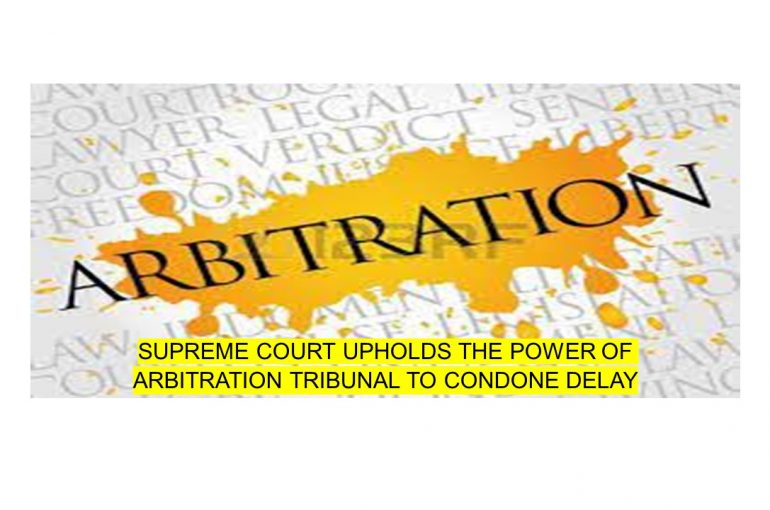SUPREME COURT UPHOLDS ARBITRAL TRIBUNAL’S POWER TO CONDONE DELAY
A Division Bench of the Supreme Court comprising of Justice Ajay Rastogi and Justice Abhay S. Oka, on 15.03.2022, upheld the power of the Arbitral Tribunal to condone delay, while deciding the case of Bihar Industrial Area Development Authority & ors. v. Rama Kant Singh (CIVIL APPEAL NO. 2030 OF 2022).
In this case, the Appellant invited tenders to carry out drainage work in an industrial area. The tender of the Respondent was accepted and a contract was executed between the Appellant and the Respondent on 15.12.2007. However, the Appellant terminated the said contract and forfeited the security amount deposited by the Respondent.
In accordance with the Bihar Public Works Contracts Disputes Arbitration Tribunal Act, 2008 (‘the 2008 Act’), the Bihar Public Works Contract Disputes Arbitration Tribunal (‘the Arbitration Tribunal’) was constituted for dealing with and deciding the disputes between the parties to a works contract. As per Section 9 of the 2008 Act, any party of a works contract may refer a dispute arising between the parties to the contract, to the Arbitral Tribunal, irrespective of the presence of an arbitration clause in the contract, within a year of the date from which the dispute has arisen.
The Respondent referred the matter to the Arbitral Tribunal on 21.03.2013, though the dispute arose on 08.06.2010. The Arbitral Tribunal on 15.09.2014, while rejecting the contention of the Appellant that the reference is barred by limitation as it has not been made within a year of when the dispute arose. The Respondent therein had pleaded that the Article 137 of the Limitation Act, 1963 (‘the 1963 Act’) would be applicable and therefore the reference was not barred. Accepting this view, the Arbitral Tribunal made an award that Respondent was entitled to a refund of the earnest money and the security deposit. The Tribunal also granted simple interest at the rate of 10% per annum on the amount to be refunded.
The Appellant challenged the award made by the Tribunal in the High Court. The High Court held that Article 137 of the 1963 Act would be applicable and, thus, the dispute raised by the Respondent was not barred by limitation.
An appeal was preferred to the Supreme Court against the Order of the High Court. The counsel for the Appellant made the contention that the 2008 Act is a local law which describes a period of limitation different from the period prescribed by the Schedule to the 1963 Act and, therefore, Section 5 of the 1963 Act will not apply. Moreover, Article 137 of the 1963 Act will have no application as the 2008 Act prescribes the period of limitation of one year. The counsel for the Respondent contended that as per the provision of Section 18 of the 2008 Act, the Arbitral Tribunal has a power to extend the period of limitation.
The Apex Court, after considering the contentions made by the parties and after reviewing sections 8, 9, 13 and 18 of the 2018 Act, observed that as laid down in Section 9 of the 2008 Act, even in the absence of an arbitration clause the dispute arising between the parties to the contract must be referred to the Arbitral Tribunal. As per Section 8 of the 2008 Act, if any of the provisions of the 2008 Act are in conflict with the 1996 Act, the latter shall prevail. Since in the present case there was no arbitration clause, Supreme Court observed that the provisions of the 2008 Act would be applicable. The Apex Court ruled that since the 2008 Act provides for a specific period of limitation, Article 137 of the schedule in the 1963 Act will not apply. However, as per the provision of Section 18 of the 2008 Act, the Arbitral Tribunal has the power to condone the delay.
The Supreme Court considered the observation made by the High Court that the delay in making the reference was sufficiently explained by the Respondent through submission that the representation made by him against the termination of contract was not decided by the Appellant for a long time. Since the Arbitral Tribunal has the power to condone the delay in making a reference, the Apex Court held that it would not be reasonable to interfere with the award of the Arbitral Tribunal on the ground that the reference was made with delay.
The Court, further observed that the Arbitral Tribunal has interpreted all the clauses of the contract and held that there was no provision therein to forfeit the earnest money as well as the security deposit. However, the Apex Court observed that Respondent’s reference petition in the Arbitral Tribunal proceeded on the footing that there is no delay, when there was delay of 21 months. Therefore, the Supreme Court, modified the award of the Arbitral Tribunal and held that only the principal amount needs to be paid by the Appellant and the interest awarded by the Arbitration Tribunal was rejected by the Apex Court.
Anuradha Kumari
Advocate
The Indian Lawyer & Allied Services
Edited by
Sushila Ram Varma
Chief Consultant and Editor
The Indian Lawyer & Allied Services





































Leave a Reply